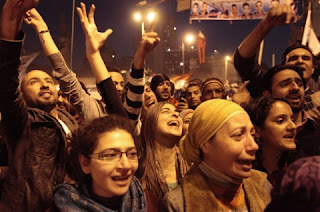When Frank Wisner, the seasoned U.S. diplomat and envoy of President Obama, met with Hosni Mubarak on Tuesday, Feb. 1, the scene must have been familiar to both men. For 30 years, American diplomats would enter one of the lavish palaces in Heliopolis, the neighborhood in Cairo from which Mubarak ruled Egypt. The Egyptian President would receive the American warmly, and the two would begin to talk about American-Egyptian relations and the fate of Middle East peace. Then the American might gently raise the issue of political reform. The President would tense up and snap back, "If I do what you want, the Islamic fundamentalists will seize power." The conversation would return to the latest twist in the peace process.
It is quite likely that a version of this exchange took place on that Tuesday. Mubarak would surely have warned Wisner that without him, Egypt would fall prey to the radicalism of the Muslim Brotherhood, Egypt's Islamist political movement. He has often reminded visitors of the U.S.'s folly in Iran in 1979, when it withdrew support for a staunch ally, the Shah, only to see the regime replaced by a nasty anti-American theocracy. But this time, the U.S. diplomat had a different response to the Egyptian President's arguments. It was time for the transition to begin.
And that was the message Obama delivered to Mubarak when the two spoke on the phone on Feb. 1. "It was a tough conversation," said an Administration official. Senior national-security aides gathered around a speakerphone in the Oval Office to listen to the call. Mubarak made it clear how difficult the uprising had been for him personally; Obama pressed the Egyptian leader to refrain from any violent response to the hundreds of thousands in the streets. But a day later, those streets — which had been remarkably peaceful since the demonstrations began — turned violent. In Cairo, Mubarak supporters, some of them wading into crowds on horseback, began battering protesters.
It was a reminder that the precise course that Egypt's revolution will take over the next few days and weeks cannot be known. The clashes between the groups supporting and opposing the government mark a new phase in the conflict. The regime has many who live off its patronage, and they could fight to keep their power. But the opposition is now energized and empowered. And the world — and the U.S. — has put Mubarak on notice.
Whatever happens in the next few days will not change the central narrative of Egypt's revolution. Historians will note that Jan. 25 marked the start of the end of Mubarak's 30-year reign. And now we'll test the theory that politicians and scholars have long debated. Will a more democratic Egypt become a radical Islamic state? Can democracy work in the Arab world?
(source: time.com)
Read more: http://www.time.com/time/world/article/0,8599,2045888,00.html#ixzz1EMKycZwG

